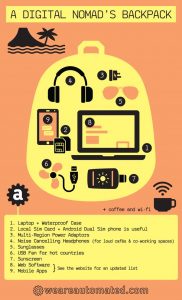In these modern times, to say the future is virtual hardly qualifies as a sweeping statement. Schoolchildren text faster than they can write; pen and paper has been rendered practically obsolete; leaving the house without a mobile device is unthinkable and living without a wi-fi connection unfathomable.
In the working world, too, companies are currently undergoing fundamental shifts that reflect the modern transition towards all that is online. Remote workforces are now in with a vengeance. As the employee cache expands to a global scale, the need for physical office spaces is shrinking proportionally. The nine-to-five population is diminishing as more and more people take the leap into remote work.
Working online creates a freedom previously out of reach for the everyday commuter, and the need to put down your roots in one place is no longer as sharply felt. For those who find travel a source of inspiration, working remotely may very well prove the ideal lifestyle. These individuals – who work and travel at the same time and use their income to support their wanderings – are known as digital nomads.
“Long term travel is not an act of rebellion against society; it’s an act of common sense within society.”
– Rolf Potts, American travel writer
What makes a digital nomad?
One can be forgiven for making the assumption that remote workers and digital nomads are one and the same, as both terms tend to be used interchangeably; however, there is one important difference between the two. According to our dear friend Wikipedia, remote workers are defined as “employees who do not commute or travel to a central place of work”, but instead “use mobile telecommunications to work from home”. Digital nomads, on the other hand, “work remotely from foreign countries” and generally “conduct their lives in a nomadic manner.” This phenomenon is only possible due to the widespread use of technological devices that allow easy communication from across the globe.
Contrary to common misconceptions, working nomadically doesn’t necessarily have to imply leading a thrifty lifestyle. Sure, accommodation and travel costs will require some strategic planning, but at least that dreaded mortgage can become nothing more than just a bad memory! From clever entrepreneurs to journalists and graphic designers, there are tons of successful digital nomads that one can learn from if considering this type of lifestyle.
Inspiring nomads
Carving out a successful career whilst fulfilling your travelling goals can be challenging, and modern digital nomads can face anything from financial problems, anxiety and depression, localisation difficulties (especially relating to medical and financial issues) as well as travel complications. Despite all this, some have managed to make it, and make it big:
Sharny and Julius
Sharny and Julius Kieser live their life by their motto, Experience, not possessions, and are the owners of a hugely successful healthy living programme which they run entirely online while travelling the world with their six children.
Christine Gilbert
Christine Gilbert has followed a nomadic lifestyle for years. She blogs about her travel experiences alongside her husband and two dogs.
Mike Elgan
Writer and editor Mike Elgan has just recently embarked on a most successful digital career, and has a finger in every important technological publication, including big names like ComputerWorld and Information Week.
Typical nomadic jobs
Though the temptation to just pack up everything and go is bound to be attractive, not just any job can suit the atypical, location independent lifestyle of a digital nomad. The prevalent trend seems to lean towards travel writing or blogging, online entrepreneurship, affiliate marketing and online tutoring, but there are plenty of other options to try out. Housesitting, for instance, can be a great way to save on your accommodation while getting paid.
Taking the leap?
Check out our favourite countries for pursuing a nomadic lifestyle. And, if writing’s your thing, why not join our own online community at Topcontent?







